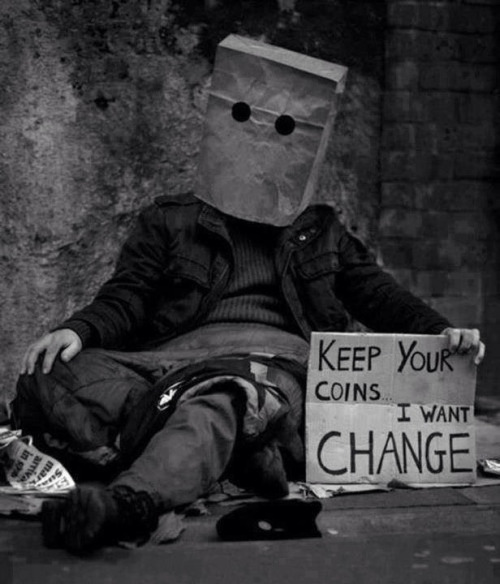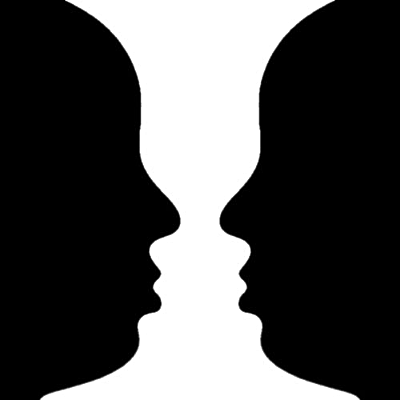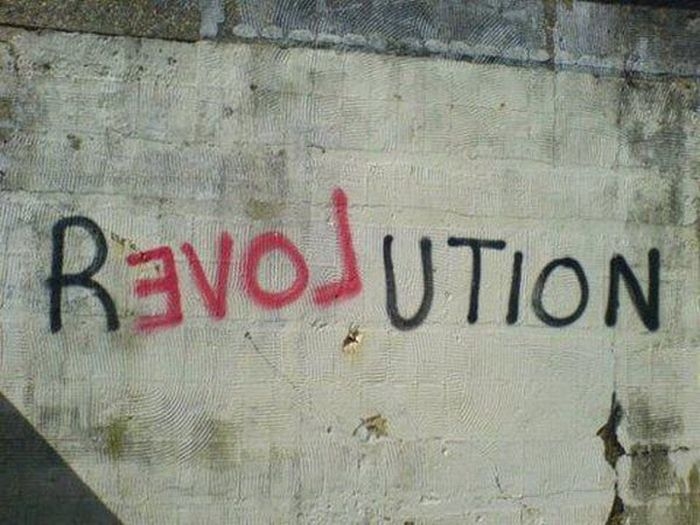Bernie Sanders says, “We need a political revolution.” As much as I agree with his sentiments, there’s never been a political revolution in history without violence. No, we don’t need a political revolution; we need a psychological revolution.
 Sander’s frequent proclamation that “what this campaign is about is not just electing a president, it is transforming America” indicates that the hope that Obama once embodied still lives in many people. But his approach also insures that that people’s hopes will be dashed again, even in the unlikely event Bernie gets elected.
Sander’s frequent proclamation that “what this campaign is about is not just electing a president, it is transforming America” indicates that the hope that Obama once embodied still lives in many people. But his approach also insures that that people’s hopes will be dashed again, even in the unlikely event Bernie gets elected.
Why? Because the inner determines the outer. Without radical change in a sufficient number of individuals, outer change is not possible.
A psychological revolution isn’t a movement; when it occurs, it will be a phenomenon. To bring about a breakthrough in this dead culture however, we have to bring about a breakthrough within ourselves.
But what kind of breakthrough exactly? To begin with, it can be a goal, but it can’t be an end. We must have intent, but can’t have intentions.
I don’t mean to sound Zenish, and speak in koans. But we don’t have a language for inner awakening. And the difficulty is compounded when speaking of changes that are not rooted in words and concepts.
People automatically want to know, ‘how do you ignite insight?’ But with regard to inner matters, ‘how?’ is a wrong question. It implies the desire for a blueprint, a method, a plan to reach a fixed goal and definite end.
Inward learning is completely different than outward learning. Outward learning—how to build a house, run a factory, acquire a skill—is accumulative and necessarily takes time.
Inward learning on the other hand entails undivided observation, initiating the unwilled movement of negation, and denying time, the idea of gradual change.
It isn’t that inward change doesn’t take time; it’s that we can’t employ time to bring it about.
One clever way of avoiding the dilemma of dualism is to soothingly say, as one of the many self-promoting gurus puts it: “Welcome every wave in the vast ocean that you are because you have no choice but to live, to really live, because you are life itself and always have been.”
That brand of snake oil sells really well on the retreat circuit these days. It basically offers a short cut from the spadework of self-knowing, pandering to the vast self-help market with schlock that we are all “beautiful expressions of life known as ‘people.’” Such stuff would be funny if it weren’t harmful to true self-understanding and freedom from duality.
What does it mean to live non-dualistically? Dualism began with the subject-object division, which means it’s as old as man. Therefore dualism has been part of the human condition since humans lived in caves.
What would living non-dualistically look like? Normally, when we encounter something we don’t like, we introduce the ideal of the opposite. Take violence for example. Seeing violence inside or outside ourselves, we introduce the idea and ideal of non-violence.
But in trying to be non-violent, we go away from the fact of violence. Which isn’t to say we should resign to being violent and living in a violent society and world.
The ideal of non-violence certainly hasn’t worked. In fact, the ideal of non-violence only produces more conflict, and therefore violence.
So at the simplest level, non-dualism means remaining with what is. It does not mean resignation, or even acceptance of what is, but passionately observing and learning from what is. Not forming an idea or ideal in opposition to what is is psychologically revolutionary.
Life constantly presents us with choices. The problem is the chooser. As Socrates pointed out millennia ago (though it never stuck), when you see something clearly, you don’t choose; you act.
Therefore rather than say ‘there is no choice’ it’s more accurate to say, there is no chooser. The chooser who thinks he or she that stands apart, muttering the modern mantra ‘I choose to be this, or I choose to be that,’ is the antithesis of human clarity and freedom.
Seeing that there is no chooser is also the direct opposite of Donald Trump’s execrable incantation to hate, “We have no choice but to ban Muslims from entering the United States.”
Try this simple experiment in seamlessly seeing-acting rather than the division of choosing and acting the next time you don’t know which direction to take on a walk.
Be mindful of yourself and your surroundings, looking ahead without thinking ahead (or behind). Don’t choose, but wait until you get to the juncture where you have to go one way or another.
When you literally ‘cross that bridge when you come to it,’ you’ll see which way to go, and your whole mind, heart and body will go the right way.
Martin LeFevre

